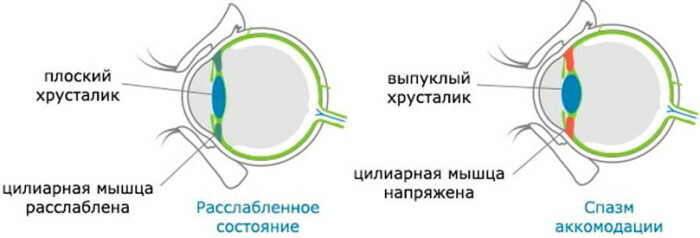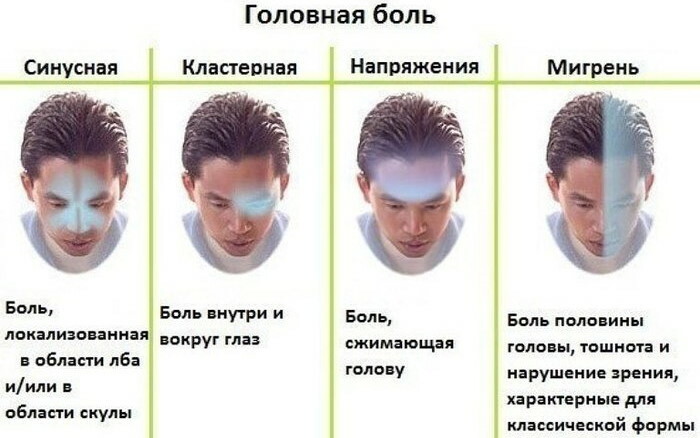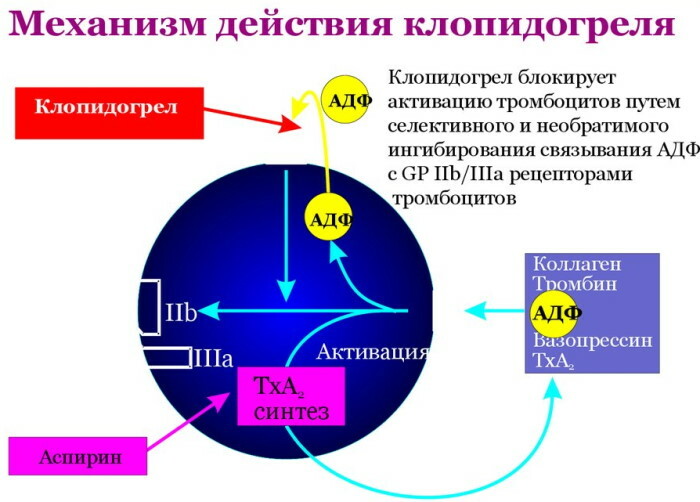Content
- Why do acupuncture and how it works
- Acupuncture benefits, health benefits
- Indications
- Contraindications
- Side effects
- Efficiency
- Features of the sessions
- Pain relief during treatment
- How often can you do it?
- Video about acupuncture
Acupuncture - one of the methods of therapeutic treatment diseases of the musculoskeletal system, organs of vision, hearing, respiration and digestion. Indications and contraindications for the procedure are determined by an endocrinologist, gastroenterologist, otolaryngologist, psychiatrist and nephrologist. Acupuncture has a complex effect on the body.
Why do acupuncture and how it works
Acupuncture (indications and contraindications will be explained by a specialist before the start of the session) - a procedure that restores the work of internal organs and systems. The method is based on the principles of Yin-Yang, astrological teachings and Taoism. Healers argued that the development of the disease is provoked by disturbances in the movement of Chi energy along the meridians. Acupuncture effect on biologically active points helps to restore harmony within the body.
Scientists have proven that acupuncture has a beneficial effect on the central nervous system. When a thin needle penetrates into the reflex zone, the nerve fibers are quickly excited, due to which the impulse is instantly transmitted to the part of the brain. Under the influence of reflexology, interneurons are activated, blocking the parts of the brain that are responsible for the perception of pain. It is in this way that the analgesic (analgesic) effect is achieved.
The endophinergic system includes many nerve endings. When exposed to a needle on them, the pituitary gland secretes endorphins, which also have an analgesic effect. After acupuncture, the functioning of the central nervous system improves.
Also, acupuncture helps to activate the areas of the brain that are responsible for the functional activity of most internal systems. The impact on the reflex zone with a needle allows you to restore blood supply and innervation of organs - a person recovers faster. The theory is confirmed by many clinical studies: patients with diseases of internal organs after acupuncture were repeatedly subjected to Doppler ultrasonography and MRI.
You also need to remember that many patients believe in the effectiveness of acupuncture. The result will be high and expected if the patient fully trusts the attending physician. This is one of the conditions for a speedy recovery.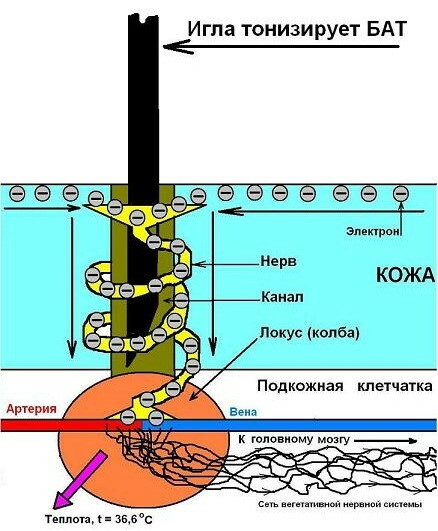
There are several main types of acupuncture:
| Acupuncture type | Method of exposure |
| Su-Jok | The needles are inserted into the bioactive points of the hands (including palms) and legs (including feet). |
| Bouncyism | First, several needles are inserted into the point at the same time, then an irritating solution is applied to the skin. |
| Tszyu therapy | A pre-warmed needle is inserted under the skin. |
Acupuncture should only be performed with sterile disposable needles. Compliance with basic safety measures minimizes the risk of various infections entering the body. The session is carried out no earlier than 40-50 minutes. before meals. It is strictly forbidden to physically overstrain before acupuncture. Also, after the procedure, you need to refrain from visiting the bathhouse and sauna.
Acupuncture benefits, health benefits
In comparison with various physiotherapeutic procedures, acupuncture has a complex effect on the entire body as a whole.
The technique is characterized by the following positive effects:
- improving the condition and appearance of the skin;
- normalization of hormone synthesis processes;
- prevention of the development of diseases of an inflammatory nature;
- increasing the body's defenses and the rate of formation of an adequate immune response;
- elimination of puffiness;
- pronounced analgesic effect;
- restoration of the psycho-emotional background;
- toning or relaxation;
- restoration of blood circulation;
- normalization of metabolic processes.
Acupuncture cannot be considered a traditional method of treatment. The principles of the method are prescientific.
Indications
Acupuncture (indications and contraindications may vary depending on the type of procedure) - one of the methods of acupuncture.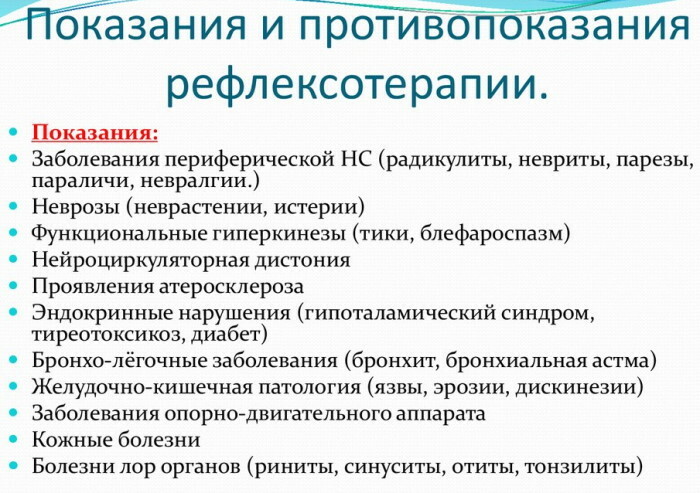
Acupuncture is widely used in the following areas of medicine:
- endocrinology;
- dermatology;
- ophthalmology;
- gynecology;
- cardiology;
- nephrology;
- gastroenterology;
- pulmonology;
- neurology;
- traumatology;
- orthopedics.
Endocrine system pathologies for which acupuncture can be prescribed:
- thyroiditis;
- thyrotoxicosis (the initial stage of the disease);
- diabetes;
- hypothyroidism;
- hypothalamic syndrome.
Diseases of the organs of vision:
- dysfunction of the oculomotor muscles;
- glaucoma;
- partial or complete loss of vision.
Reproductive diseases in women:
- menopause;
- infertility caused by hormonal imbalance;
- amenorrhea;
- dysmenorrhea;
- dysfunction of one or two ovaries at the same time.
Pathology of the urinary system:
- chronic cystitis;
- BPH;
- nephritis.
Diseases of the digestive tract:
- cholestasis;
- chronic constipation;
- ulcerative lesions of the duodenum and stomach;
- gastroduodenitis;
- systematic dyspeptic disorders;
- gastrology.
Diseases of the heart and blood vessels:
- arterial hypertension and hypotension;
- atrioventricular block;
- arrhythmia;
- cardiac ischemia;
- bradycardia;
- tachycardia.
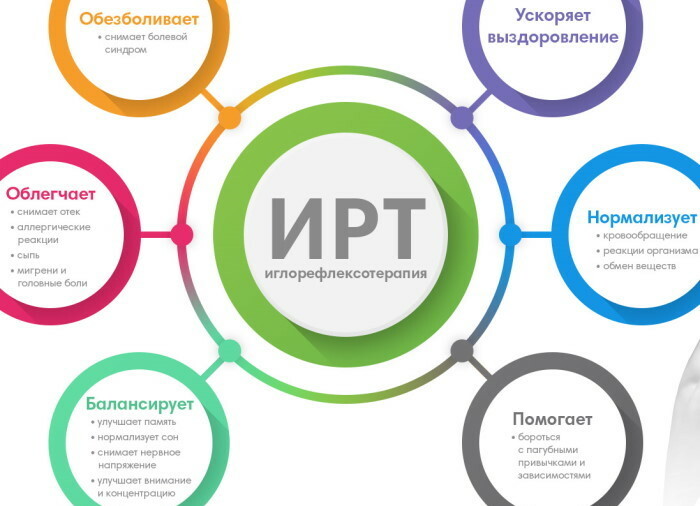
Respiratory pathology:
- chronic pneumonia (excluding the period of exacerbation);
- bronchitis;
- bronchospasm;
- tracheitis;
- chronic laryngitis;
- laryngotracheitis;
- tonsillitis;
- pharyngitis;
- bronchial asthma.
Diseases of the peripheral and central nervous system:
- nervous tic;
- hysterical seizures;
- bed-wetting;
- neurosis;
- lingering headaches;
- vegetative dystonia;
- dizziness;
- neuritis;
- neuralgia.
Diseases of the musculoskeletal system:
- scoliosis;
- violation of the integrity of the bones;
- bursitis;
- myositis;
- stretching of muscles and ligaments;
- periarthritis;
- arthrosis;
- arthritis;
- osteochondrosis;
- radiculitis;
- hernia.
Also, acupuncture can be prescribed to people who systematically abuse alcohol, tobacco and drugs. Also, the method is used in the fight against obesity (regardless of the type). Acupuncture is prescribed for hypersensitive people with allergies, urticaria, eczema, neurodermatitis and itchy skin.
Contraindications
Acupuncture (indications and contraindications are individual factors) - one of the methods of pain relief. Despite the effectiveness, procedures are not prescribed in some cases. Acupuncture has a number of relative and absolute contraindications.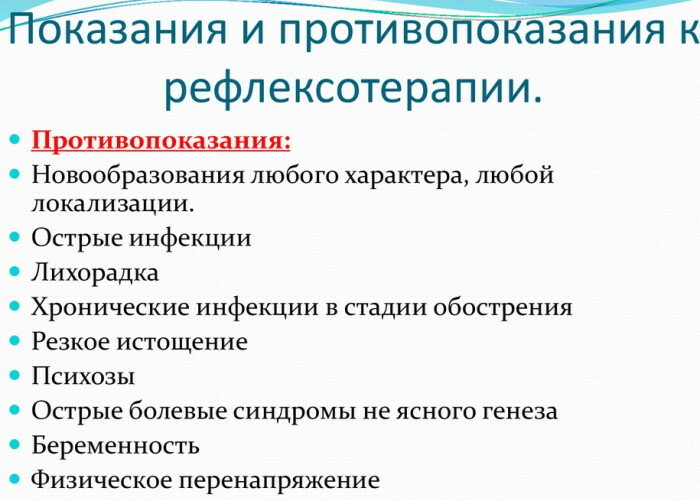
The latter include:
- The period of bearing a child. Exposure to reflex zones with a needle can provoke an involuntary miscarriage.
- Acute pain syndrome of unexplained etiology. Spasms may indicate the development of a number of pathologies in which it is strictly forbidden to carry out acupuncture.
- Conditions requiring surgical intervention. Acupuncture is not indicated for perforated ulcers, inguinal hernia and appendicitis. These conditions are life-threatening and patients require urgent surgery.
- Pathology of infectious etiology. Acupuncture is not prescribed for diseases of a venereal nature, hepatitis, tuberculosis (open form) and AIDS. Exposure to reflex points with needles can accelerate the spread of infection through internal organs and systems.
- Fever. Temperature jumps negatively affect the work of the peripheral and central nervous system, therefore acupuncture is contraindicated in this state for the patient.
- Intoxication, caused by the use of alcoholic beverages and drugs. Most often, this type of poisoning is accompanied by mental disorders, so the patient is not able to behave adequately and comply with all medical requirements.
- Mental disorders. Puncturing the skin with a needle can cause discomfort. The patient experiences stress during the procedure, which provokes an attack of aggression and arousal.
- Diseases of the blood. Reflexotherapy is contraindicated in hemophilia and leukemia. The procedure speeds up the blood circulation process, provoking a deterioration in the patient's condition.
- Oncology. Blood circulation during acupuncture is accelerated, which can contribute to the active growth of neoplasms and the spread of metastases.
Also, children's age can be considered an absolute contraindication.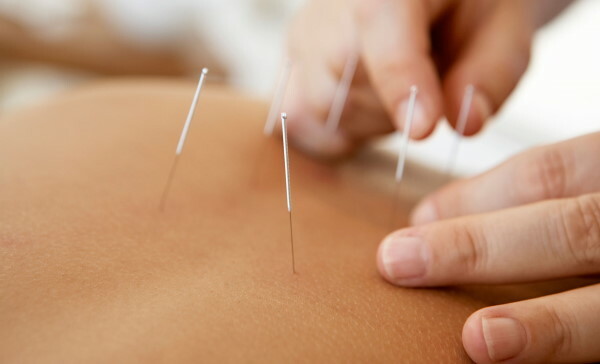
The following are considered relative restrictions on the appointment of acupuncture:
- emotional and physical stress;
- muscular dystrophy;
- sclerosis;
- myocardial infarction;
- stroke;
- polio;
- extreme exhaustion.
Typically, elderly patients over 75 years of age are not prescribed acupuncture. It is also recommended to refrain from the procedure for patients suffering from varicose veins.
Side effects
If the basic rules for introducing needles into biologically active points are not followed, there is a high risk of developing side effects.
These include:
- Blood pressure surges. A side effect occurs in patients arriving in a stressful situation at the time of reflexology. Physical fatigue can also lead to hypotension. The condition is characterized by fainting, bouts of nausea, weakness, vibration in the ears, and mild dizziness.
- Malignant neoplasm. A complication occurs against the background of trauma to a tumor of a benign type, keloid scars, moles or birthmarks. These formations consist of cells capable of transforming into a malignant tumor.
- Damage to tendons, nerve endings and blood vessels. A side effect is observed when the depth of needle insertion is not observed. An inexperienced specialist can damage one of the structures of the body. If the needle has been inserted into a tendon, nerve or vessel, then the patient experiences acute pain. If pathogenic microorganisms enter the wound, there is a high risk of developing necrosis.
- Infection. The complication is caused by the use of non-sterile needles. Pathogens cannot be destroyed by boiling the instrument, soaking it in hydrogen peroxide or alcohol. If you use the same needle multiple times, there is a high risk of contracting AIDS or hepatitis.
The most common side effects include bruising and swelling where the needle is inserted. Most often, the complication is caused by a violation of the integrity of a small or large vessel.
Efficiency
The positive effect is observed after 3-4 sessions. Patients note an improvement in the general condition, a decrease in swelling in the affected area.
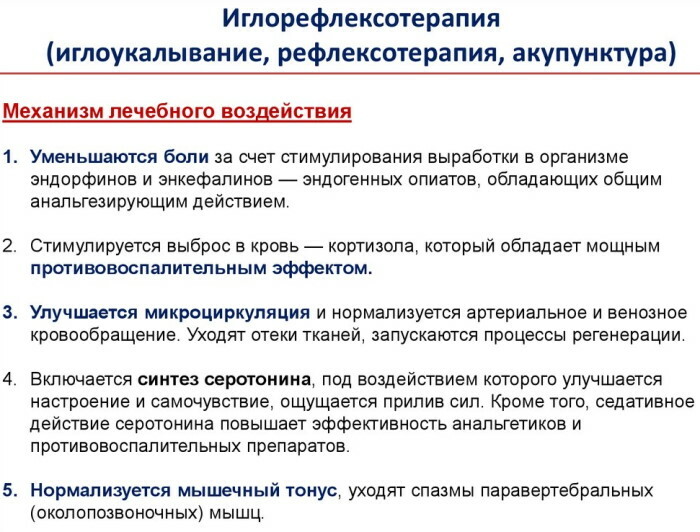 Pain attacks, according to reviews, occur less frequently. The psycho-emotional background and sleep are restored.
Pain attacks, according to reviews, occur less frequently. The psycho-emotional background and sleep are restored.
Features of the sessions
Acupuncture, which has a number of relative indications and contraindications, should be performed by a qualified specialist. So that during the procedure the patient does not experience discomfort, the chiropractor should use the acupuncture process thin special needles (no more than 0.3 mm in diameter) with rounded ends.
When they are introduced into the skin, the tissues are moved apart, and not torn. The patient should lie down on the couch and try to completely relax. The procedure takes place in several stages.
Reflexologist:
- denotes active points on the patient's body with a black marker;
- easily massages and wipes the skin with any antiseptic solution;
- gently inserts the needle into the biologically active point;
- leaves the patient for 45-60 minutes.
The atmosphere in the treatment room should be relaxing. You can include light, unobtrusive music in the background. After inserting the needles, the patient should feel a slight itching or tingling sensation. This reaction indicates correct needle placement. The patient may feel mild drowsiness and relaxation.
According to reviews, after the session, a person experiences a surge of vivacity. The psycho-emotional background returns to normal, the processes of blood circulation and digestion are fully restored. The duration of the effect directly depends on the number of procedures.
Pain relief during treatment
Usually, anesthesia is not used during acupuncture. At the request of the patient, in the presence of hypersensitivity or a low pain threshold, a specialist can apply an aerosol containing lidocaine to the skin. It is advisable to simply endure the short-term discomfort without resorting to the use of an anesthetic drug.
How often can you do it?
Experts recommend doing acupuncture no more than 1-2 times a week. For diseases of the digestive tract or the musculoskeletal system, the course of treatment should include 8-10 procedures. If necessary, repeat it after 7 days. The treatment regimen should be selected individually by a reflexologist.
Acupuncture is a relatively safe and effective method of treating some pathologies. Indications and contraindications for the procedure should be determined by a reflexologist during the examination. The course of treatment is selected individually.
Video about acupuncture
Acupuncture benefits and harms:

